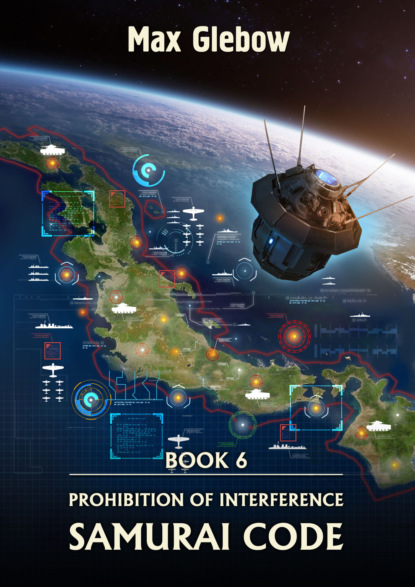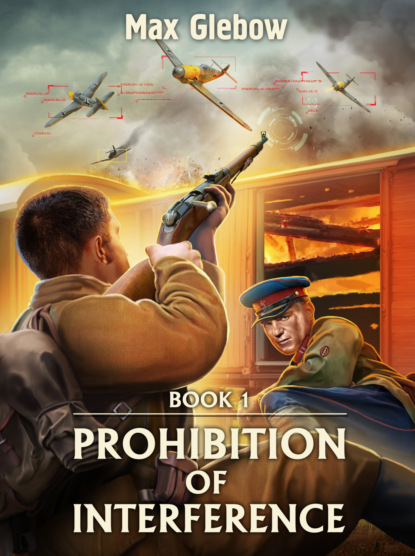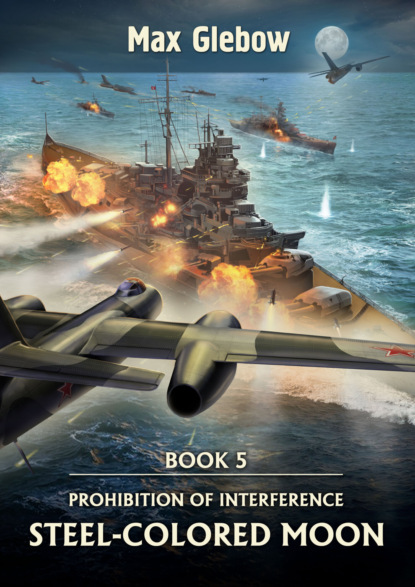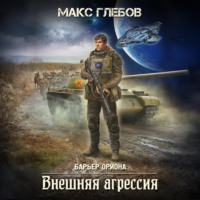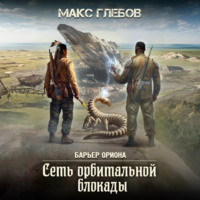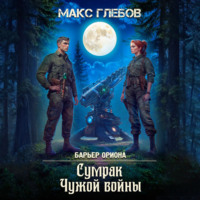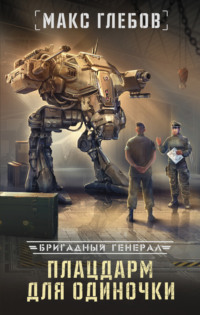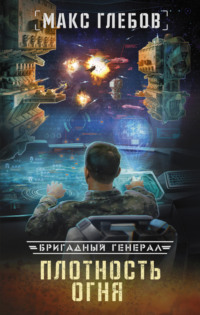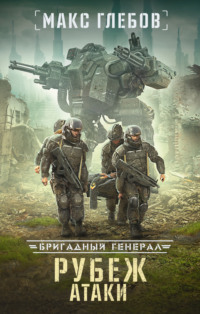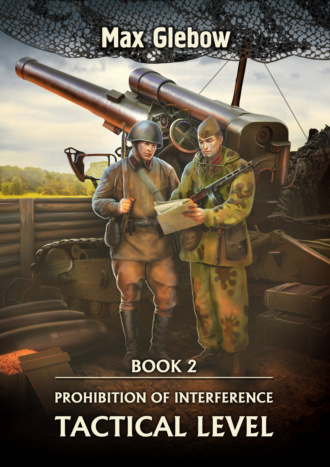
Полная версия
Prohibition of Interference. Book 2. Tactical Level
The Major rose to meet him. It had been relatively easy for him the last few days.
“It's good to see you, Erich,” said the Colonel without a smile, “I was afraid it was much worse.”
“Herr Oberst,” the doctor said to the guest, “Major Schliemann suffered a serious concussion. Please try not to make him nervous.”
“I'll take that into account,” the Colonel nodded, and the doctor quietly left, closing the door behind him.
“How do you feel, Erich?”
“You're absolutely right, it could be worse,” the Major shrugged, “You know, Heinrich, I had no idea that the Communists could act so quickly. That barrage of fire… My battalion was wiped out.”
“Russian rocket artillery,” the Colonel winced, “So far they don't have many of these weapons, but it looks like the enemy command is banking on them. Our Nebelwerfers are more accurate, but the Bolsheviks have a longer range and more shells in a volley. It's not a pleasant thing.”
“I've had the opportunity to see it for myself,” Schliemann nodded.
“What happened there, Erich? The testimony of the survivors doesn't make the picture very clear. Did the Russian marksman manage to get away?”
“Most likely yes, Herr Oberst. Unless, of course, he was caught by accidental shrapnel. I ordered my men not to shoot him – I wanted to take him alive, but the Russians hit with such force that anything could have happened.”
“This is bad, Erich. Very bad. I think you should understand the depth of the trouble that awaits us in the near future. Our operation was already known at the top, and now, if the Russians put their new firing equipment into production…”
“It's not so terrible, Heinrich,” Schliemann said with a slight smile on his face.
“Is that so?” The Colonel asked incredulously.
“There is no special equipment, Herr Oberst,” the Major's voice sounded confident, “I saw him firing an anti-aircraft gun. There's an open platform, not even a shield, and I was able to see everything in detail. The gunner had no special equipment, and the anti-aircraft gun looked perfectly standard. It's just one person. Yes, he's a genius marksman, but it's not about a device that can be given to every soldier, it's purely about his personal qualities or special abilities. But he's just one, you know? He is the only unique person in the entire Bolshevik army, and one shooter, no matter how good he is, cannot determine the outcome of the war, especially if he is stopped in time.”
“Are you sure about that, Erich? He shoots without seeing the target,” said the Colonel thoughtfully, “How does he do it? Not by ear! Although… If there's no equipment, maybe it's some kind of medication that increases perception by an order of magnitude?”
“Then why is there only one, Heinrich? No, it's not the chemistry. In addition, it is difficult to imagine how strong the drug must be, to amplify hearing and vision in such a way. This Russian has demonstrated his abilities for far too long. If he had been on powerful stimulants all this time, he would have died a long time ago, there are no miracles.”
The Colonel was silent for some time, pondering what he had heard, but Schliemann saw that Richtengden's face gradually smoothed out, as if a heavy burden had been lifted from him and he was told that he no longer needed to carry it.
“I'm sure I can find him and close the problem for Germany once and for all,” Schliemann's face was grim with determination.
“Is this revenge, Erich?” Richtengden grinned, “It seems that this Russian was able to get under your skin.”
“He is only a savage, Heinrich, but a dangerous savage, and he must be stopped before he kills hundreds of our soldiers.”
“Well, well…” said the Colonel indefinitely, “Get well, Erich. You gave me some very important information, and I'm sure it will be highly appreciated on the top. I think your personal participation in the hunt for the Russian shooter will be approved. In any case, I'll keep you informed.”
* * *My rank was confirmed for me. In the Personnel Department I received a new Identity Book and a referral to the 300th Infantry Division, to be exact, to its separate reconnaissance company, which surprised me somewhat, but when I saw the name of my new commander in the document, I only grinned. Captain Shcheglov, it seems, got his way, and I must confess, I was only happy about it.
Sergeant Pluzhnikov was taken to the rear. I managed to visit him in the field hospital, and he said that the shrapnel had caught something serious, and he would be back in action in three months at best. But Chezhin and Sharkov went to their new duty station with me, and there was obviously someone's unobtrusive interference.
They took the Panzerbüchse away from me almost immediately, despite all my insistence, but I still had the Walther stashed away and would not give it away. But now I, as the future commander of the reconnaissance platoon, was given a Shpagin submachine gun and a Nagant revolver. These weapons were extremely difficult to aim, but both the PPSh and the revolver were good for close combat.
“Well, hello, Nagulin,” Shcheglov replied to my report with a satisfied smile, “I didn't expect to see you so soon. Honestly, I'm glad to see you like one of my own. Of my men with whom I started the war, only Ignatov and Nikiforov remained. How did you get into scouting? I thought you were going to the air defense, but that's how it turned out.”
“It's hard to say, Comrade Captain. I thought it was you who wrote a report asking me to be assigned to you…”
“Who needs my report, Nagulin?” grinned Shcheglov, “I don't think anyone would listen to me.”
“My men from the anti-tank rifle crew were sent to you with me.”
“Chezhin and Sharkov?” The Captain nodded, “Good fighters. They're not scouts, of course, but they've been through so much that we can coach them quickly. They took away your German gun?”
“They said it wasn't allowed.”
“It's a pity. It was a good thing… Though why would a scout need it?”
“I'd find a use for it.”
“I don't doubt it. You, Nagulin, can find a job for a sea mine in reconnaissance, too, if you're given one.”
I smiled. Shcheglov looked tired, but collected and businesslike. It was clear that command was pushing his company very hard, but the Captain was not giving up.
“You'll take the second platoon,” my new commander has moved on, “Ignatov is in command there for now, but it's not a sergeant's position, although he knows the service.”
“Copy that!”
“I'll give you until tonight to get up to speed, and then I'll make all the demands. We don't have time to chill here. Command shakes us all the time and demands information about the enemy. The Germans occupied Kremenchuk, seized a bridgehead on our bank of the Dnieper and are ferrying infantry units to it. Our troops tried to hold on to the big islands, of which there are plenty, but the Germans quickly drove us out of there. We can't throw them into the river – we don't have enough forces, so all we can do is hold the Germans back. An order came from the army headquarters to the division. They need prisoners to find out what is going on in the bridgehead and to uncover German plans. How the hell did they get so hot over there, if the Army Headquarters is giving out such orders? It's not their level. I would have understood if Regimental Headquarters had sent such an order…”
“The weather is bad,” I shrugged, “it's raining a lot and it's cloudy. The aviation does not fly, so there is no information, and the high headquarters are afraid, that the Germans will strike from here to the north, to the rear of the South-Western Front.”
“How do you know this, Nagulin? Or does the front commander himself report the situation to you?”
“I don't know, Comrade Captain. I'm just guessing, based on what you told me.”
“That's it, Junior Lieutenant, you're free. Go settle in and take over Ignatov's platoon, and I still have to get the group ready for the evening to go out for a prisoner who will talk. There aren't even a dozen experienced scouts in the company. The rest are ordinary infantry. I can't send them on such a mission.”
“Permission for me to go with the group, Comrade Captain?”
“You'll have this opportunity more than once, Nagulin, don't fuss.”
“The Germans are up to something, I can feel it. Then it may be too late.”
“So you feel…” said Shcheglov thoughtfully, sinking down on a rough stool, “You used to say 'I hear' or 'I see,' and I believed you. Or rather, I didn't believe it right away, but then I didn't doubt it anymore. And now you say 'I feel,' and again I want to brush off those 'feelings' of yours. But Captain Shcheglov does not keep making the same mistakes. Okay, you're in the group. I'll take you myself – you're not familiar with the local conditions yet, so I won't trust you with people on the first mission. We meet here at midnight, we leave at one-thirty. Look, Nagulin, you asked for it.”
“Permission to go take the platoon and get ready?”
“Go, Junior Lieutenant, though, wait a minute. You know who I met this morning at the First Battalion position?”
I waited silently for the continuation, looking at the Captain with interest.
“Sergeant Major Serova. She even asked me where to find the battalion commander. Lipovich assigned her as a sniper in the third company. Today is just a meeting day, don't you think?”
* * *The weather favored us. Low cloud cover obscured the moon, and the rustle of drizzling rain concealed the sounds. Even the flares weren't much help to the enemy – their light was lost in the rain. It was wet, dirty, but at least not too cold. It would be an exaggeration to call the German defense line discontinuous, but there were gaps between the trenches and strongholds. The enemy gradually expanded the Kremenchuk bridgehead, and the Germans did not always have time to equip full-fledged positions. It would be great to hit them now with a couple of tank divisions supported by heavy artillery, but where to get them? The Southwestern Front has almost no reserves, and the forces allocated by the General Headquarters are spent on flank counterstrikes against the advancing Guderian tanks.
“There's the enemy's machine-gun position ahead – 130 meters forward and 15 meters to the left,” I reported to Sheglov, who had long ceased to be surprised by such revelations on my part, “It's better to go around it on the left. On the right there's a continuous line of trenches, and the Germans do not sleep there.”
“Got it,” the Captain nodded, changing direction, and we crawled forward, crouching to the ground in the flashes of flares flying into the sky.
There was regular rumbling all around – the Germans were delivering disturbing fire at the positions of the 300th Infantry Division. Our troops tried to respond, but they were clearly saving shells.
Since the order to seize a prisoner for interrogation came directly from the headquarters of the 38th Army, the division commander gave Captain Shcheglov a corresponding task. The top brass didn't want just anyone. Ordinary soldiers or noncommissioned officers can not know much, although one can argue with this – exceptions occur, but the probability of coming across such a knowledgeable lower-ranking person is still not too high. So we were ordered to take an officer, and that made it very difficult. The bridgehead is not the Germans' deep rear on the western bank of the Dnieper. Officers don't walk around here alone, and we still have to find them in the middle of the night in pitch black when we have to stick our faces in the dirt after every flash of a flare.
In fact, there was almost certainly no point in capturing some ordinary infantry lieutenant, either, and I told Shcheglov about this at once. The Captain grimaced, realizing that I was offering him a raid deep into the German bridgehead, but in the end he agreed. I needed to do this for two purposes. First, I wanted to be on the bank of the Dnieper to be able to tell the Captain that I had heard and seen signs of preparations for the delivery of heavy equipment to the bridgehead, and second, I needed a successful operation in order to gain a certain credibility in the eyes of division commander Kuznetsov, otherwise he simply would not listen to me.
The gap in German positions was explained quite simply. They were cut in two by a ravine overgrown with bushes, with a stream running along the bottom, which was turbid from the mud that flowed down the slopes. This waterlogged place was completely unsuitable for combat operations, and the Germans limited themselves to setting up a dozen and a half mines in the most passable places.
The computer highlighted these German surprises to me in an alarming orange color, but Shcheglov was not born yesterday either and knew very well, what one could run into in such places.
“Remizov, move forward,” the Captain ordered quietly.
The sapper moved slowly deep into the ravine, checking the ground in front of him with a special probing rod, while I was careful to make sure that he would not miss the deadly gift from the Germans in the dark and slippery mud. The Captain looked concentrated, but I didn't feel too much tension in him. Apparently, the commander was confident in his subordinate's qualifications. In any case, Remizov was up to the task. He did not touch the mines he found, but only raised his hand each time and carefully crawled around the dangerous spot. The group followed in his wake.
There were five of us on the raid. Besides me, Remizov and the Captain, Sergeant Ignatov and Pfc Nikiforov, who were very familiar to me, were with us. The only person new to me in the group was the sapper.
We traversed the first German defense line for about an hour and a half, and when it was behind us, the scouts looked like big moving lumps of mud. Only the weapons, which everyone was trying to protect, looked more or less clean. But now we could afford to move faster, since there were noticeably fewer Germans.
Enemy infantry moved in separate groups along some very bad roads leading from the coast to the front line. It looked like the Germans used the night time to reinforce their troops on the bridgehead. There were also horsed antitank guns, and this indicated that not only ordinary boats but also more serious watercraft were involved in the crossing.
“We must keep going, Comrade Captain,” I suggested softly to Shcheglov, “everything will become clearer near the river, and there are probably officers there – someone has to distribute the incoming soldiers. And here we can search for control points until the morning, and it's not a fact that we'll find them.”
“Go right, Nagulin,” the Captain nodded toward the nearest group of trees, which seemed a vague blur in the darkness. It was obvious that he really did not want to get into the middle of this snake's nest, but Shcheglov saw no other way to perform the command's task.
In about 40 minutes we came to the Dnieper. The splash of the oars and the muffled commands in German resounded far and wide in the moisture-soaked air. No one prevented the Germans from crossing the river. It seemed that the command of the Southwestern Front did not consider an increase in the number of enemy infantry on the Kremenchuk bridgehead a serious problem for itself; moreover, it had, by and large, no way to effectively prevent the Wehrmacht infantry divisions from moving across the Dnieper at night.
We got almost to the shore. I unobtrusively straightened our route, and eventually we came to one of the distribution points for soldiers arriving from the west bank. Not that there were many boats, but they regularly came ashore, emerging from the damp haze. The Oberleutnant, surrounded by a few noncommissioned officers and a couple of dozen soldiers, was in charge of meeting the new arrivals. The boats poked their noses into the shore, and the Germans quickly unloaded and formed a marching order. The local Oberleutnant briefed their commanders, gave the forming columns an escort, and sent them east. That was a real Ordnung.
One could not even dream of capturing the Oberleutnant as a prisoner for interrogation. He was surrounded by many soldiers the whole time, but even if we had succeeded, his disappearance would have almost instantly turned the river bank into a disturbed anthill, and we would not have been allowed to leave in peace.
We had been lying motionless for nearly two hours in the wet grass under cover of not too dense bushes and watching the shore. The situation looked like a dead end. All officers arriving by boat went to the front in platoon columns, and attacking such a column with our forces was out of question.
I knew that German sappers had already built a pontoon bridge to one of the islands closer to their shore. Now this structure could not withstand tanks and other heavy equipment, but light artillery and trucks moved confidently over this bridge. This greatly simplified the task of crossing the infantry divisions, and by and large this bridge should have been destroyed immediately, but our command knew nothing about it yet, and it was only possible to get proof of the existence of this bridge here.
Judging by the fact that the columns of German tanks continued inexorable movement toward Kremenchuk, the Germans were soon to begin building a bridge across the Dnieper. They were already bringing in pontoons and the necessary materials for construction and storing them on the opposite bank. With such a concentration of forces and means, German sappers could accomplish the task very quickly, and then a very unpleasant surprise in the form of a strike from the south by von Kleist's Panzer Group 1 threatened our 300th Division, the 38th Army, and the entire Southwestern Front.
“You called me ashore, Junior Lieutenant,” Shcheglov couldn't stand it, “Here we are, then what?”
“Just a minute, Comrade Captain,” I asked, closing my eyes and concentrating.
The night and low clouds made it very difficult to see the details, but I did manage to spot a boat heading toward our shore, the composition of its passengers being somewhat different from the rest of the boats. The German officer who crossed to the eastern bank of the Dnieper was not of high rank. By playing with the filter settings, I was able to see his insignia – the Hauptmann. Perhaps it was a company commander, or maybe a battalion-level staff officer. The computer had no additional information about him – he wasn't Guderian after all.
“I'm afraid I'm going to have to take a little swim,” I finally said, which seemed to put Shcheglov into a slight stupor. I should have hurried up and made my point clear. “Comrade Captain, the boats approach the shore at 10–15 minute intervals. Every fourth one is a freighter. There are only four soldiers on oars, one or two noncommissioned officers, and an officer, as a rule, a lieutenant or Oberleutnant – probably a platoon leader. They don't expect an attack, especially from the water. You remember, I think, how I know how to handle knives. Only I must start now, or the boat with the officer will get too close to our shore, and my actions will be discovered.”
“Do you realize that if something goes wrong, there's nothing we can do to help you?” Shcheglov answered after a second pause, looking somewhere in the distance.
“I understand that, Comrade Captain. There are no Germans a kilometer downstream. They don't control the whole shore behind them – apparently, they believe that no one but their own can come from here. I'll try to be there in an hour at the latest. If I don't make it in an hour, I won't go to the meeting point – I'll hide on some small island and wait for the next night.”
Shcheglov glanced at his watch. He didn't want to let me go alone, it was obvious, but the group still didn't have time to complete the task any other way in the time remaining before dawn, so the Captain essentially had no choice.
“We'll wait for you for two hours,” Shcheglov cut off in a tone that could not tolerate objections, “Then the group leaves. If you make it sooner, we have a better chance of getting to our troops without shooting. If you don't find the right boat, come back immediately, that's an order. Have you understood everything, Nagulin?”
Chapter 3
The water was quite cold, but bearable enough. I left my Nagant and PPSh with my ammunition and all my iron, except the knives, with the Captain. But I had six knives hanging from my belt, and two more in special sheaths mounted on my shoulders so that I could reach and throw them in one motion.
The quietest and most inconspicuous way to swim is underwater. That's what I chose. Holding my breath for five minutes did not cause me undue stress, and in that time I could swim a long enough distance. I didn't need to dive out to get my bearings, so I headed straight for the point where I planned to meet the Hauptmann's boat. It took me about ten minutes to get there, and now I was about 50 meters away from my target. The boat turned out to be quite large and could have been equipped with a motor, but the Germans, who had such motors, decided not to make any noise and preferred to use oars.
My plan did not contain any subtle tricks and was based solely on surprise, speed and accuracy. I assumed that the Germans would not be expecting an attack on a route already traversed by other boats dozens of times that night, and I was confident that the speed and precision of my body movements far exceeded the the reaction and coordination of the movements of the locals. As it turned out a little later, I was very much mistaken.
I waited underwater, and when the enemy boat was a meter from my head, I made a sharp movement with my legs that pushed me upward. At the same time, I grabbed the bow of the boat, and threw my body over the side, which tilted slightly.
The soldiers, who were oaring, didn't even have time to realize what had happened. They were only a few meters away from me, and I couldn't miss from that distance. Hauptmann, comfortably seated in the stern, did not have time to react either, or rather, he reached for his holster, but the handle of the knife that struck him in the forehead rendered the officer unconscious for several minutes. But the non-commissioned officer, who on closer inspection turned out to be a Stabsfeldwebel, showed better training than all the other Germans in the boat, and in addition, he had more time than the soldiers who died almost instantly.
I feared he would start screaming, trying to raise the alarm, or try firing his MP-40, but apparently the German knew he might not make it in time. I didn't even notice him pulling a knife, as I was busy first with the soldiers and then with their commander, and when my attention did shift to the last enemy, the German had already thrown his weapon. I must say, he did it masterfully, and his knife was as good as mine.
The unexpectedness of the attack played a cruel joke on me – I was not prepared for such a development. Instantly assessing the threat, the computer took control of my muscles and jerked me to the left with a U-turn, disregarding my body's physiological capabilities. The combat mode of the implants allows me to do such tricks under the condition of an immediate threat to life. I needed to keep my body as trained as possible just for occasions like this. Such a stunt would put an unprepared person in a hospital bed for a very long time.
The Stabsfeldwebel's knife, aimed at my heart, ripped through my blouse and flew into the water, tearing the skin on my shoulder. I didn't even notice this wound. My spine cracked, my back muscles felt like they were exploding with pain, and I could hardly keep from screaming, but I couldn't stop. The German, not the least bit embarrassed by the fact that I managed to dodge his knife, had already grabbed his submachine gun. I jumped forward, ignoring the pain in my protesting muscles. The boat rocked, and the German, who had begun to raise his weapon, lost his balance. In principle, it didn't make any difference – he wouldn't have had time to pull the breechblock anyway. At the last moment, the Stabsfeldwebel tried to shield himself with his submachine gun, but my fist took a circular trajectory and struck the German in the cheekbone. There was an unpleasant crunch, and my enemy's body went limp. I picked up the MP-40, which had fallen from his weakened hands, and laid it carefully on the bottom of the boat.


